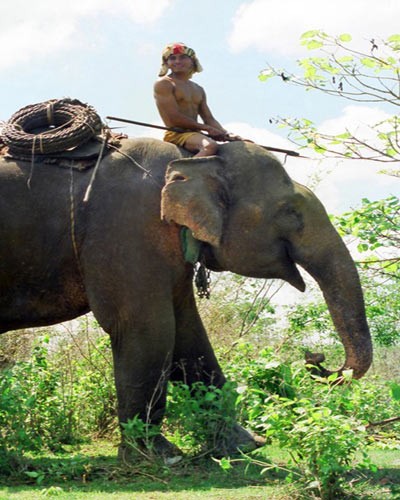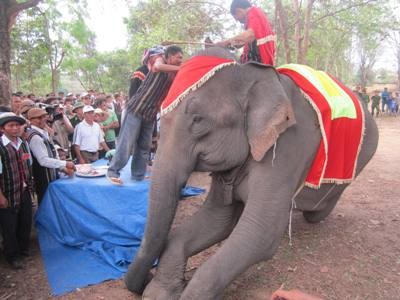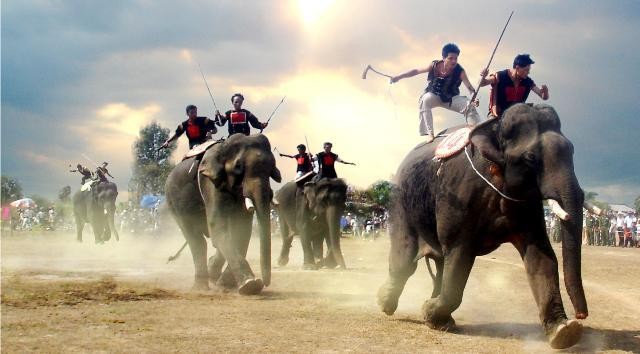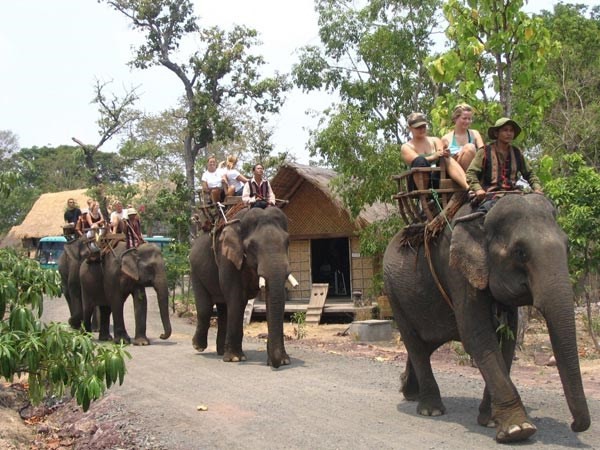(VOVworld) –The M’Nong are famous for hunting and taming elephants in the Central Highlands. Elephant are their valuable assets and have an important position in their spiritual and cultural lives. Elephants are considered members of the community and everything related to the elephants must follow the M’Nong traditions.
 |
A coil of rope and a goad are important tools to tame elephants
(photo: langvieton;ine.vn)
|
Historical documents in the Dac Lac Ethnic Museum show that Y Thu K’Nul (1827-1937) was the ancestor of the elephant hunting and taming job of the M’Nong in Don village. He caught about 500 wild elephants and was given the title “King of Elephant Hunters”. Don village and the Dac Lac Ethnic Museum have preserved many stories, documents, and tools for elephant hunting hundreds of years ago. Dao Minh Ngoc, a museum staff, said “Hunting and taming elephants is a tradition of the M’Nong ethnic people. They have experience in making traps or directly catching elephants. An elephant hunt in the past involved 10 experienced men and 5 or 6 tamed elephants. They used tamed elephants to surround wild elephants and tried to noose the small ones from 2 to 4 years old. Small elephants are easily tamed.”
The small elephants were domesticated by experienced tamers within 5 to 7 months in the forest. It would take some years to discipline stubborn ones. When the elephants could follow orders, they would be taken to the hamlet to attend a ceremony to become members of the community. The patriarch told the villagers that “an elephant is like a man” which meant people and elephants had to share sentiments as members of the community. The villagers prayed that the elephants would be obedient and could go straight on the hamlet roads. The elephants would work as hard as an endless spring to help the villagers grow rice and maize in the terraced fields.”

A ceremony to pray for the elephants |
Hunting elephants is banned by Vietnamese law and the international convention on protecting wild animals. The M’Nong have continued to raise and tame elephants and maintained their traditional rituals for the elephants. Dam Nang Long’s family in Don village has tamed elephants for generations. He said: “The elephants have material, spiritual, and cultural values. When the rainy season comes, the M’Nong hold a ceremony for the elephants and tell them that nature will bring them a lot of food. In the end of the rainy season and the beginning of the dry season, we tell them that food is running out and they should try to overcome the hard time. The M’Nong accompany the elephants at work and share what we have with the elephants.”
 |
| An elephant race in Dac Lac |
Elephants have become a symbol of the Central Highlands. They work with people in the field, transport goods, and help them build houses. Tourists to Don village or Lien Son township enjoy riding elephants around the hamlet or to the forest. Y Tinh told us about his elephant. “This is Y Mam which means happy. We must understand it to control it. When we are in the forest, it eats leaves. When we go home, it prefers banana and sugar cane. I give it salt water to drink and it always remembers the way home. When I wake up in the morning, I look at its eyes and face. When it is ill, I let it relax and give it medicine. We love each other.”
 |
Tourists ride elephants to go sight-seeing
|
In recent years, the forests have shrunken and the number of elephants has reduced. Dac Lac province has implemented many measures to protect and develop the tamed elephant herd. The Dac Lac provincial department of Agriculture and Rural Development has built an Elephant Preservation Center in Yorkdon national park, aiming to increase the number of elephants and improve the community’s awareness and responsibility in protecting the elephants as a cultural heritage in the Central Highlands.